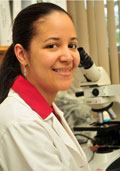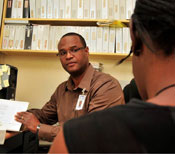Fogarty role cited in Haiti's AIDS progress
March - April, 2009 | Volume 8, Issue 2
Port-au-Prince, Haiti - As a new generation of Haitian researchers joins GHESKIO's ranks, they're steeped in the philosophy that has been fundamental to the center's success - that the classroom, the lab and the clinic are closely linked and each plays an essential role in the research cycle.
Training improves the quality of the research, which leads to better implementation of treatments and interventions, which results in better care, they say. In turn, contact with the patients informs the research process.

Dr. Cynthia Riviere is
one of the initial
graduates of Haiti's
first master's in public
health program.
Many in their ranks have completed research training both locally and abroad, much of it with Fogarty support. Such opportunities are essential to building sustainable research capacity in Haiti, says GHESKIO physician-scientist Dr. Cynthia Riviere.
"If you bring the expertise from abroad into the country and then they deliver and then they leave, then what's left behind?," she says. "You risk going back to ground zero. Because there's no continuity, there was no one who was trained to do the follow-up."
Riviere was one of the initial graduates of Haiti's new master of public health program, the country's first degree-level health research training. Situated at Quisqueya University, adjacent to GHESKIO's main clinic, it was developed by the two institutions in collabo¬ration with Cornell University and Fogarty. It has the capacity to train up to 25 participants each year, in contrast to the small number that could be sent abroad to study.
It's also more economical and practical for those in mid-career positions who can't leave the country for extended periods. There's no issue of "brain drain" because students remain in Haiti.
Unlike U.S. programs, the coursework is tailored to diseases most relevant to Haitians, such as drug-resistant TB and cervical cancer. Both are common in Haiti but pose less of a threat in developed countries.
"The ability to respond to our own reality is the most important thing that we will gain from having this training here in our own country," says Dr. Patrice Joseph, who teaches in the MPH program and leads TB and HIV research projects.
The master's curriculum acknowledges the country's unique cultural issues. For example, Riviere is researching cervical cancer screening, a challenge in a place where many women are not used to gynecological exams.
Haiti's long tradition of voodoo also affects health care delivery.

Dr. Patrice Severe says contact
with patients in GHESKIO's clinic
informs his research approach.
"When a patient comes to you, you have to tell him, ‘OK, I can understand that there is a spiritual thing regarding your illness, but at the same time, as a physician there is something I can contribute.' You can't deny his beliefs," says Dr. Patrice Severe, a GHESKIO researcher and clinician for 10 years.
Because the Haitian scientists speak the native Creole language and understand the cultural sensitivities in a way foreigners may not, they can often more easily formulate the pressing research questions and develop the most effective solutions. These efforts can be surprisingly successful.
For instance, it was assumed that antiretroviral regimens were too complicated for use in people with HIV in low-resource countries.
Severe was first author on a seminal research paper that proved otherwise - antiretroviral therapy worked as well among Haitians as it did Americans.
Syphilis transmission from mother to child is another significant health problem for the country.
Dr. Linda Severe, who heads GHESKIO's sexually transmitted diseases unit, helped confirm a new rapid diagnostic test that could be used at remote sites was nearly as accurate as the more time-consuming lab version.
If a pregnant woman tested positive, she could immediately be given a shot to prevent transmitting the disease to her child.
"That's the power of research, you improve people's lives," she says. "Even though it's a poor country - you think research might be difficult - still there are things that can be done."
Training opportunities in more advanced countries are essential to keeping GHESKIO's leaders informed and alerting them where they need to be headed, they say. But everything must be adapted to their own reality.
"It's the ideal that you need to reach, but you need to reach it in your own environment and you need to work with what you have and know what your problem is," Riviere says.
For example, the new HPV vaccine may have the potential to reduce cervical cancer deaths in Haiti. But it only targets certain strains of the virus.
Linda Severe has many questions to study to determine if the vaccine will help locally. "You have to do research in order to take advantage of what the world has to offer," she says. "How will people embrace it, will they be scared of it? Will they accept it?"
With so many health problems to be solved and so many research discoveries to be implemented, the center's leaders stress the importance of continued training to ensure GHESKIO's future.
This new generation must be ready to carry on the work begun by the center's founder and leader, Dr. Bill Pape, and to build on his record, says Joseph. "GHESKIO should be an institution that we will have forever in Haiti."
"That's the power of research, you improve people's lives," she says. "Even though it's a poor country - you think research might be difficult - still there are things that can be done."
Periodic training opportunities in more advanced countries are essential to keeping GHESKIO's leaders informed and alerting them where they need to be headed, they say. But everything must be adapted to their own reality.
"It's the ideal that you need to reach, but you need to reach it in your own environment and you need to work with what you have and know what your problem is," Riviere says.
For example, the new HPV vaccine may have the potential to reduce cervical cancer deaths in Haiti. But it targets only certain strains of the virus.
Linda Severe has many questions to study to determine if the vaccine will help locally. "You have to do research in order to take advantage of what the world has to offer," she says. "How will people embrace it, will they be scared of it? Will they accept it?"
With so many health problems to be solved and so many research discoveries to be implemented, the center's leaders stress the importance of continued training to ensure GHESKIO's future.
This new generation must be ready to carry on the work begun by the center's founder and leader, Dr. Bill Pape, and to build on his record, says Joseph. "GHESKIO should be an institution that we will have forever in Haiti."
To view Adobe PDF files,
download current, free accessible plug-ins from Adobe's website.